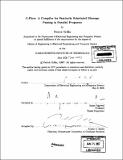C-Flow : a compiler for statically scheduled message passing in parallel programs
Author(s)
Griffin, Patrick (Patrick Robert)
DownloadFull printable version (4.097Mb)
Alternative title
Compiler for statically scheduled message passing in parallel programs
Other Contributors
Massachusetts Institute of Technology. Dept. of Electrical Engineering and Computer Science.
Advisor
Anant Agarwal.
Terms of use
Metadata
Show full item recordAbstract
Performance improvement in future microprocessors will rely more on the exploitation of parallelism than increases in clock frequency, leading to more multi-core and tiled processor architectures. Despite continuing research into parallelizing compilers, programming multiple instruction stream architectures remains difficult. This document describes C-Flow, a compiler system enabling statically-scheduled message passing between programs running on separate processors. When combined with statically-scheduled, low-latency networks like those in the MIT Raw processor, C-Flow provides the programmer with a simple but comprehensive messaging interface that can be used from high-level languages like C. The use of statically-scheduled messaging allows for fine-grained (single-word) messages that would be quite inefficient in the more traditional message passing systems used in cluster computers. Such fine-grained parallelism is possible because, as in systolic array machines, the network provides all of the necessary synchronization between tiles. On the Raw processor, C-Flow reduces development complexity by allowing the programmer to schedule static messages from a high-level language instead of using assembly code. C-Flow programs have been developed for arrays with 64 or more processor tiles and hve demonstrated performance within twenty percent of hand-optimized assembly.
Description
Thesis (M. Eng.)--Massachusetts Institute of Technology, Dept. of Electrical Engineering and Computer Science, 2005. Includes bibliographical references (p. 95-96).
Date issued
2005Department
Massachusetts Institute of Technology. Department of Electrical Engineering and Computer SciencePublisher
Massachusetts Institute of Technology
Keywords
Electrical Engineering and Computer Science.